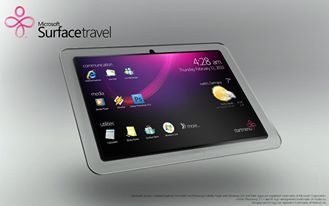 Traditional PC units (desktop and notebooks/netbooks) are in secular decline, consistent with most investor expectations that have observed the cannibalization of this market by smartphones and tablets over the past several years and the data points over the past two quarters that point to not only slower growth but an actual decline in unit sales year over year. Many of us still have a notebook, but we just don’t use it as much since we adopted a smartphone to function like a BlackBerry and an iPad to take notes and access email and content on the web.
Traditional PC units (desktop and notebooks/netbooks) are in secular decline, consistent with most investor expectations that have observed the cannibalization of this market by smartphones and tablets over the past several years and the data points over the past two quarters that point to not only slower growth but an actual decline in unit sales year over year. Many of us still have a notebook, but we just don’t use it as much since we adopted a smartphone to function like a BlackBerry and an iPad to take notes and access email and content on the web.
There are things we still need a notebook for, so we bring it along when we know we need it, but we don’t upgrade as quickly as we used to (and we don’t drop it as often), and we are beginning to substitute other products for Office, since Office does not work on the iPad or Android devices.
To say the PC market is in secular decline is accurate with respect to traditional form factors, but one needs to consider for Microsoft that the market is also broadening to include the new Ultrabook touch form factors (these are really hybrid devices, more notebook than tablets) and Windows based tablets (which with a keyboard are also hybrid devices but more tablet than notebook). The challenge is in deciding how much demand will decline for traditional devices as users buy iPads and others buy new Windows 8 based devices.
Some of the hardware vendors seem to have been unsure about Windows 8 demand and have not shipped innovative products or in high supply for the new platform. We view Surface from Microsoft as the elegance of design that hardware vendors should strive for in the tablet market, and most have fallen short of exciting hardware innovation.
Those that have been more innovative seem to be sold out (Lenovo Yoga, Acer Aspire S7, Dell XPS 27 All-In-One). The Lenovo Clover Trail based ThinkPad Tablet 2 looks cool but is still not available, like a number of other devices. We expect this to resolve itself over the next quarter or so.
Clover Trail Vs ARM
We think Clover Trail will be a popular chip for tablets in addition to ARM, given the backward compatibility and manageability of the Intel platform for enterprise users. Clover Trail is priced about the same as ARM and has about the same battery life if used for the same things. One may chose to do more with it, like running Outlook, but this carries a battery life penalty (we are told by an industry friend) of about 15%.
The Intel platform has the advantage of being able to run legacy software (including iTunes) and can be managed by the same tools IT uses to manage a Windows 7 device, it can access the network and be authenticated like a Windows 7 device, and can have software downloaded to it from across the corporate network the way a Windows 7 device can.